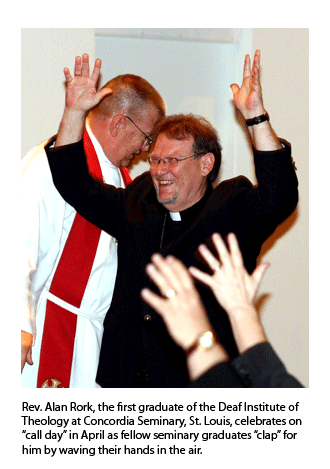By Paula Schlueter Ross
When Alan Rork received his first call from Concordia Seminary, St. Louis, this spring to serve the Synod’s Indiana District as a missionary to the deaf, his fe
That gesture meant a lot to Rork, who is deaf and the first graduate of the seminary’s four-year-old Deaf Institute of Theology (DIT).
“It felt great,” Rork told Reporter via e-mail, “and inspired my heart to see people waving [their] hands to mean congratulations for my graduation.”
Rork, 66, completed five years of Web-based “DeafPah!” classes that are designed to prepare congregational leaders, plus four years of online DIT seminary-level courses that included sign-language video lessons and mentoring by a local pastor. “Pah!” is an expression “signed” — and often said — by deaf people when they suddenly understand something, similar to the hearing person’s “aha!”
After his July 20 installation, he will serve 103 deaf and 13 hearing members at eight congregations in Anderson, Indianapolis, Kokomo, Michigan City, Muncie, and Seymour, Ind.
Rork, who’s been deaf since he contracted spinal meningitis at the age of 21 months, said he is “excited about serving many deaf congregations” because deaf people “want a deaf pastor [who can] understand their communication.”
He believes God saved his life and led him to become a pastor so that more deaf people will hear God’s Word, he said. Only about 2 percent of deaf people in the United States are Christian, say LCMS deaf-ministry leaders.
The DIT is similar to the seminary’s Ethnic Immigrant Institute of Theology (EIIT), a distance-education program that prepares African, Hispanic, and other immigrants for pastoral ministry.
Both the DIT and EIIT programs are considered “cross-cultural,” according to Rev. John Reinke, co-chairman of the Synod’s Deaf Missions Task Force and a longtime missionary to the deaf in the Synod’s South Wisconsin District.
The spoken and written English of a traditional seminary education “is a real struggle” for many deaf people, who are more accustomed to “signing,” so “that’s why we need to put it into a signed format for them, so that they can then teach it, convey it, to our deaf members,” said Reinke, who was born with hearing loss and wears a hearing aid.
“If we’re going to continue deaf ministry, we have to train deaf people how to do it and have them take up the role,” he said. “Hearing people [in deaf ministry] are great, but hearing people are not into the deaf culture — they don’t socialize with deaf people, they don’t know where deaf people are.”
Rork, on the other hand, “is involved with deaf people all the time,” said Reinke. “And so, to have him trained as a pastor, he is going to have so many more opportunities to reach out.”
“Hearing” congregations that use sign-language interpreters can be “a viable option,” according to Reinke, but it’s hard for deaf members to communicate with hearing members and become truly “integrated” like they can in a deaf congregation, where others know sign language.
“Also, ‘hearing’ worship is hard for deaf people because it’s got a lot of words, a lot of vocabulary,” he noted. Deaf worship and deaf “hymns” have few
Only five of the Synod’s 17 full-time missionaries to the deaf are deaf themselves, and there are six deaf deacons — DeafPah! graduates — serving part-time ministries. That’s about half as many deaf-ministry workers as a decade ago, according to Dr. Rodney Rynearson, a longtime deaf-ministry executive with the Board for Mission Services who’s coming out of retirement to serve as the board’s director of deaf missions.
Rynearson, who’s considered the founder of the DIT, says he wanted to start the pastor-training program because he “believed strongly” that the deaf could serve as pastors, but they needed to be trained within their own culture. He credits God with making the DIT a reality.
Seeing Rork graduate is “fantastic,” Rynearson said, and he’s “thankful to God that so many people worked so hard to help Alan Rork achieve his goal of becoming a pastor through alternative seminary education.”
For more information about DeafPah! or the Deaf Institute of Theology, visit the Web site www.csl.edu/Academics_DIT.aspx or send an e-mail to dit@csl.edu.
Posted July 17, 2008

